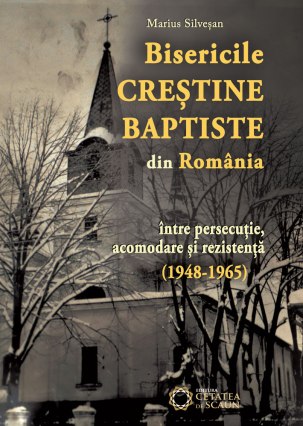
În cadrul Analelor Universității din Craiova, seria Istorie, Bogdan Emanuel Răduț, istoric și autor al unor cărți privind istoria evanghelicilor în comunism, a publicat o recenzie a cărții mele, Bisericile Creștine Baptiste din România între persecuție, acomodare și rezistență, 1948-1965, recenzie pe care o public și eu mai jos preluată de pe blogul autorului http://emyradut.blogspot.ro/2013/06/marius-silvesan-baptiste-christian.html.
 Marius Silveşan, The Baptiste Christian Churches from Romania among persecution, accommodation and resistance (1948-1965), Cetatea de Scaun Publishing Press, Târgovişte, 2012, 410 pages.
Marius Silveşan, The Baptiste Christian Churches from Romania among persecution, accommodation and resistance (1948-1965), Cetatea de Scaun Publishing Press, Târgovişte, 2012, 410 pages. We have been witnessing lately new historiographical ,memorial issues and, why not, some of them even journalistic about the evangelical believers in the Romanian communist regime, although they are better known under the name of evangelicals. The weak, but promising start of a new generation of historians gives us the hope that over the coming years to point out, at least by and large, which was their status and role in the post-communist Romania.
Starting from PhD thesis sustained in 2010 at the University of Bucharest coordinated by Professor Dinu C.Giurescu, the work of the historian Marius Silveşan leads us into the Baptist community during the years of Romanian stalinism. These were probably the most troubled years of communism in our country, a fact that arises from some realities face at that time:the crowded prisons with political, and religious prisoners and the mass deportations. The years 1948-1965 were also characterized by multiple national transformations: collectivization, five year plans , nationalization and there’s no doubt that these changes affected the communities and the Baptist believers.
Still from the title it is clearly that the volume involves three approaches: persecution accommodation and resistance. The Baptist churches had been recognized as a legal cult since 1944. But, between the public discourse and reality there was a big difference. Marius Silveşan sought to emphasise this difference, proving bringing proofs in order to sustain the idea of persecution. The slogans according to which there was religious freedom are in total contrast with the historical realities of that period. The regulations, assignations, dismissals, the investigations, assassinations- to list only a few of them- were realities faced by the Baptist believers and others like them, although the legal denominations had religious rights recognised by the Constitution, and the Decree no. 177 ( 1948).
Starting from the sources of the archives, most of them revolutionary, dr. Marius Silveşan has carried out a summary of great necessity for both the Baptist believers as well as for other evangelical denominations and historians interested in this period..
The complexity of the book is apparent both in the contents, as well as its bibliography, a fact that proves the professionalism with which it was approached..
The volume is structured in several sections with different approaches. Chapter I –„Social, political, institutional and legislative changes in the first decades of communism in Romania”, „Social, political, institutional and legislative changes in the first decades of communism in Romania”, introduces the reader into the social, political and cultural life of the period.
When we refer to the religious life, we have in mind the Constitution that guaranteed religious freedom, at least de jure. In Chapter II – „Baptist Christian Churches and the dynamics of the religious life between the years 1948-1965”, – the author shows us who are the Baptist believers, as well as their dynamics. Following the history line until 1856 when the first Baptists were recorded in Romania, Silveşan emphasizes their development over time, until the end ‘ of 1980s. In this section, any reader can get acquainted with the internal mechanisms of the Baptist denomination. Chapter III – „The Baptist pastors – A life dedicated to ministry?” – is a collection of five portraits preceded by a historical approach on the rules of the entitlement to preach at that time. Chapter IV – „The Theological Education”,- presents the institution that prepared the Baptist pastors for ministry, in this case the Baptist Theological Institute in Bucharest. In that period some Baptist pastors (such as Alexa Popovici and Ioan Bunaciu) completed their theological studies at other theological centers such as the Othodox Theological Seminary from Bucharest or the Protestant Theological Seminary from Cluj-Napoca. In Chapter V – „The harmony between religious denominations –a factor of popular democracy”, -we find the relationships of the Baptist denomination with the Romanian Orthodox Church and other Evangelical denominations (in 1950 the state united all Evangelical denominations in the Federation of Evangelical Denominations from The Popular Republic of Romania; this federation included the following denominations: Baptist Church, Adventist Church, Pentecostal Church , Evangelical Church)and similar churches from abroad (the external relations were carefully monitored and governed by authorities). Chapters VI –„The Baptist churches between persecution and accomodation”, – and VII – „The response of the Christian Baptist churches to the constraints of the state. Actions of questioning and response” – defines the idea of oscillation of the Baptist leaders between accommodation and resistance. The biographies, portraits, personal histories that the author emphasizes with their lights and shadows, are very interesting and presented in an authentic style on the principle sine Ira et studio. Some of the Baptist leaders had to endure persecution for their beliefs, while others made compromises. From the actions of questioning of the oppressive system that limited the freedom of faith proclaimed by the Constitution, we can mention various reports of the pastors , illegal baptisms, the founding of the Committee for the Defense of Religious Freedom and of Conscience (A. L. R. C. ), and so on. It is important to mention the fact that these actions did not register only between the years 1948-1965, but also during the Socialist regime and, in particular, in the years ’70 and ’80. The impressive work of dr. Silveşan ends with conclusions and opinions of some key figures from the Baptist community and not only. The bibliography is followed by 10 annexes with documents and photos, as well as an index meant to help the reader in finding the information he looks for.
I do not intend to end my paper without presenting a few opinions of some well-known historians, as they are presented in the book. The introduction is written by PhD Ecaterina Lung (University of Bucharest), who emphasises that „It must be stated from the beginning that the book is about a denominational history, written by a member of the Baptist community, but at the same time, it should be stressed that it is a history written with scientific objectivity and in compliance with all the requirements of professional ethics. The insight that Marius Silveșan can have into the subject allows him to understand better the phenomena and to explain them to those less familiar with these. At the same time, the status of historian, acquired at the University of Bucharest, helps him to overcome easily the fact that he is a member of the Baptist denomination and „do his job” correctly and well-balanced. PhD Adrian Cioroianu (University of Bucharest): „The main merit of work consists, I believe, in the theme itself: there’s no doubt that the history of this religious minority from Romania is one of the chapters of national history which must be known and investigated better, in the context of the religious life in the first two decades of Communist Regime”. PhD Alexandru Neagoe (The West University of Timişoara):”The purpose of the thesis is to establish the historical truth about the relationship between the communist State and the Baptist churches as it can be reconstituted by means of an attentive analysis of genuine documents [ … ] and the scarce bibliography available in books and magazines”. PhD Cristian Barta (Babeş-Bolyai University, Cluj Napoca ): „The subject treated by Mr. Marius Silveşan is of high interest and completes with professionalism the stage of the research in the relationships between the state and Christian churches in Romania in the first two decades from the issuing of the Law on religious denominations by the communist regime (1948). Academist Dinu C. Giurescu, the scientific counsellor of the doctoral thesis that represents the starting point of the present work states that: „an orderly exposure follows the plan of a work designed to present and analyze a theme which had not been the studied before, in this case the Baptist church between the years 1948-1965.”
Even though the book is addressed to a certain public that is acquainted with this subject, we appreciate the historical magnitude and complexity of the volume and its framing in the Romanian historiography on the relationships between the state and churches during the Communist regime. Baptist churches have always militated in favor of religious freedom, faith and conscience, and also for the separation between church and state. These principles made them to endure courageously the post-communist years of oppression, an on the other hand, to oppose the State’s interference in the internal affairs of the Church.
I congratulate PhD Marius Silveşan, hoping that the issuing of this work will bring clarity in the relationships between the Romanian communist state and Romanian Evangelical churches, and the Baptist church in particular.
In conclusion PhD Otniel Ioan Bunaciu, the president of the The Baptist Union of Romania considers that „the work of Mr. Marius Silvesan represents an important contribution in the research and understanding of a complex past. The author uses a balanced historical approach of the events from the post-communist period and in consequence, this work avoids the subjectivity of personal interpretations, by trying to clarify and to lead the reader to a better understanding of a past that has left its mark on the religious life of the Baptists from Romania up to the present. „
Bogdan Emanuel Răduţ













